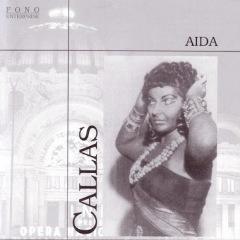Giuseppe Verdi - Aida (Callas) [2001]
Giuseppe Verdi - Aida (Callas) [2001]

CD1 1. Act One: Preludio 2. Act One: Se quel guerrier io fossi 3. Act One: Celeste Aida 4. Act One: Quale insolita fiamma 5. Act One: Alta cagion v'aduna 6. Act One: Ritorna vincitor 7. Act One: Immenso Fthà 8. Act Two: Chi mai, fra gl'inni 9. Act Two: Fu la sorte dell'armi 10. Act Two: Gloria all'Egitto 11. Act Two: Salvator della patria CD2 1. Act Two: O re, pei sacri numi 2. Act Three: O tu che sei d'Osiride 3. Act Three: Qui Radamès verrà 4. Act Three: O cieli azzurri 5. Act Three: Ciel, mio padre! 6. Act Three: Rivedrai le foreste imbalsamate 7. Act Three: Pur ti riveggo 8. Act Three: Ah no! Fuggiamo 9. Act Four: L'aborrita rivale 10. Act Four: Ohimé, morir mi sento 11. Act Four: La fatal pietra 12. Act Four: O terra addio Aida: Maria Callas Amneris: Giulietta Simionato Radames: Kurt Baum Amonasro: Robert Weede Ramfis: Nicola Moscona Il Re: Ignacio Ruffino Un messaggero: Carlos Sagarminaga Una sacerdotessa: Rosita Rodriguez Orquesta & Coro del Palacio de Bellas Artes Guido Picco - conductor Mexico City, May 30, 1950
In late 1869 du Locle, Verdi’s friend and representative in Paris who had been travelling in Egypt, told Verdi that the Khedive (Viceroy) of Egypt wanted Verdi to write an opera. This was required to be on an Egyptian theme and was for performance at the new opera house in Cairo built to celebrate the construction of the Suez Canal. The theatre had opened in November 1869 with a performance of Rigoletto conducted by Verdi’s former pupil Emanuele Muzio. The Suez Canal was officially opened on 17 November 1869. Verdi at first turned down the request repeating his refusal when in Paris the following spring. But Du Locle was not deterred and sent Verdi a synopsis by Mariette, a French national and renowned Egyptologist in the employ of the Khedive. Stimulated by the synopsis, and also, perhaps, by the fact that Du Locle had been authorised to approach Gounod or Wagner if he continued to prove reluctant, Verdi wrote to Du Locle on 2 June 1870 setting out his terms. These included a fee of 150,000 Francs, payable at the Rothschild Bank in Paris on delivery of the work. His terms were accepted making Verdi the highest paid composer ever.
Throughout the process Verdi was keen to achieve the greatest historical accuracy. He asked Du Locle to gather information from Mariette about the sacred dances of the Egyptian priestesses. He was intent on a Grand Opera of spectacle and ballet following the Paris Opéra pattern. Aida is one of Verdi’s most popular of operas with its blend of musical invention and dramatic expression. It is a work of pageant with its Grand March (Gloria all’Egitto) and ballet interludes. It is also a work involving various personal relationships. Of these relationships, the rivalry between Aida, daughter of the King of Ethiopia working incognito as a captured slave of Amneris, daughter of the King of Egypt, is intense. Both love Radames, victorious leader of the Egyptian army. He loves Aida but is given the hand of Amneris in reward for his exploits as army commander. But even more complex is the relationship of Aida with her father who arrives as an unrecognised prisoner. A range and variety of complex possibilities of the father-daughter relationship occur throughout Verdi’s operas, but nowhere more starkly than here where the father puts tremendous emotional pressure on his daughter to cajole her lover into betraying a state secret. This betrayal will cost the lives of the two lovers.
Verdi had Aida ready in time for the premiere in Egypt in January 1871, but Bismarck had engineered a Franco-Prussian confrontation in autumn 1870. The French army was defeated at the Battle of Sedan and the Emperor Napoleon III captured. With the siege of Paris by the Prussians the scenery constructed there could not be got out and shipped to Cairo. Aida was not premiered until Christmas Eve 1871. It is an opera requiring big spinto voices with the capacity to convey the drama and emotion through the voice. ---Robert J Farr, musicweb-international.com
download: uploaded yandex 4shared mediafire solidfiles mega zalivalka filecloudio anonfiles oboom
Last Updated (Friday, 13 June 2014 23:22)
